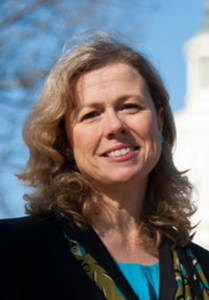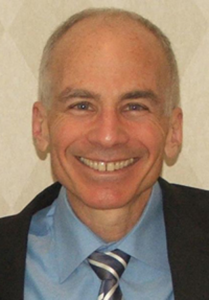Georgetown Law’s Climate Center Seizes Moment to Push Clean Energy Policy
December 17, 2020
Climate change is rising on the nation’s political agenda — and Georgetown Law faculty and staff are offering up expert advice on how to address it.

Professor Vicki Arroyo
Professor from Practice Vicki Arroyo, who leads the acclaimed Georgetown Climate Center, is playing a leading role.
In a major report, she and a pair of former students who now work as attorneys at the Center — Matthew Goetz (L ‘14) and Annie Bennett (L ‘13) — offer the new Biden-Harris administration guidance about how it can make transportation programs cleaner and greener. In their chapter, they make recommendations for the administration’s first 100 days, and urge incoming officials at the U.S. Department of Transportation to take a “climate in all policies” approach to governance.
One top recommendation for former Democratic presidential candidate Pete Buttigieg, if his nomination to head the U.S. Department of Transportation is confirmed: Immediately create a climate council within the department to signal the issue’s importance and to coordinate efforts to address it with other federal agencies. Arroyo and her coathors also urge the incoming transportation secretary to create a new electric vehicle task force and strengthen federal partnerships with states and localities.
The 300-page “Climate21” report also offers advice for 10 other federal offices and departments — going far beyond traditional environmental agencies and supporting a holistic response to the climate crisis. It is intended to serve as a blueprint for the new administration as it assumes power — and indeed, it has been delivered to Biden’s transition team for that purpose.
“The reaction has been great, and the Climate21 work seems especially relevant and appreciated due to the setbacks in the transition process this year,” said Arroyo, who was also on the report’s steering committee. Since its release last month, she has discussed its recommendations during webinars with other clean energy and transportation experts.
“It certainly seems like there’s great interest in making climate change a ‘whole of government’ priority, and particularly to reduce carbon emissions and create jobs,” Goetz said. “It’s an important message. There’s a real opportunity here.”
Expert Advice
Arroyo, Goetz and Bennett aren’t the only members of the Georgetown Law community who are offering advice during the presidential transition period.

Professor Lawrence Gostin
O’Neill Professor of Global Health Law Lawrence Gostin recently published an article in the Journal of the American Medical Association about how the new administration should tackle the COVID-19 pandemic. And students in Visiting Professor Cori Alonso-Yoder’s Federal Legislation Clinic co-authored “Comprehensive Recommendations for the Presidential Transition Team on Preventing Abuses of Internationally Recruited Workers” for their client, Centro de los Derechos del Migrante, Inc. and the Migration that Works labor rights working group.
Arroyo, for her part, is playing an influential role. In November, she joined other climate experts in informing a recent article about how the new administration can address warming temperatures and rising sea levels. In October, the United Nations Sustainable Development Solutions Network released the Zero Carbon Action Plan (ZCAP), a report featuring advice she, Goetz, and other academic experts developed on the U.S. transition to clean energy. Arroyo is the only person to serve as a lead author and steering committee member of both the Climate21 and ZCAP reports.
Arroyo’s work on the ZCAP report was informed by her time as Chair of the Transportation Research Board and as facilitator of the Transportation and Climate Initiative (TCI) which seeks to develop a clean energy economy, improve transportation, and reduce carbon emissions in the transportation sector in the Northeast and Mid-Atlantic regions.
“Most people blame coal-burning power plants for global warming,” said Scott Novak (L ‘20), a recent graduate who was a student in Arroyo’s practicum course and now supports states in TCI as a fellow at the Georgetown Climate Center. “But trucks, automobiles, and other vehicles are now the leading source of greenhouse gas emissions.”
Making the case for cleaner transportation — through electric vehicles and charging stations, pedestrian-safe and bike-friendly cities, low-carbon fuel for planes and trucks, and more — is really important, Novak said.
An auspicious moment
The positive reaction to the center’s transportation work signals an auspicious moment for environmental experts and advocates, Arroyo said.
In the weeks since Election Day, Biden has appointed former Secretary of State John Kerry as special presidential envoy for climate, and he named as his domestic climate chief Gina McCarthy, a former administrator of the Environmental Protection Agency and a “founding mother” of the Georgetown Climate Center. Biden has also promised to re-enter the global Paris Agreement and is expected to sign a raft of climate-related executive orders on his first day in office.
Arroyo says that Biden’s early actions and announcements are “very much in keeping” with her and other experts’ climate recommendations, including ensuring that climate change policy considerations and personnel are embedded across government.
Advocates believe prospects for major climate legislation are limited and will narrow if the GOP retains control of the U.S. Senate. But Arroyo says Biden has considerable executive authority to “move the needle” on climate policy. She hopes he will take steps to reduce the power sector’s greenhouse gas emissions and allow California to require cleaner cars — efforts that were blocked by the Trump administration. And she hopes lawmakers will fund electric vehicle charging infrastructure, support for transit, and other clean transportation provisions in upcoming legislation.
In the meantime, she and the Georgetown Climate Center team plan to support clean energy policy at all levels of government, by conducting research, facilitating dialogues, testifying before Congress, and educating policymakers.
“We will continue to inform federal efforts and support state and local leadership on climate policy and how they prepare for the impacts of a changing climate,” Arroyo said. “That is the role the Georgetown Climate Center was founded for, and we’re excited to be in a position to make a real difference in this pivotal moment.”